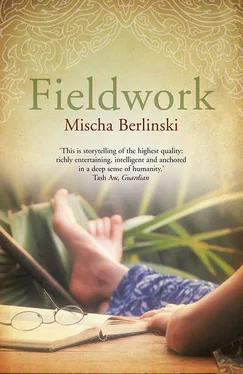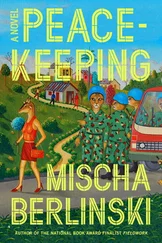Gilles leaned forward and rearranged the lilies in the vase.
"You can't imagine it was an easy life she led in that village," he said. "Even if she had the money to buy her own rice and pork and vegetables and did not go to work in the fields. But she had to carry those huge buckets of water up the hill every day — it gave her the most beautiful shoulders and arms, that work, like marble. Just to wash her clothes took her a half a day. She never allowed herself to wear dirty clothes, that was something she would not do, and she always wanted to wear nice clothes, those lovely Dyalo skirts and blouses, and so every day she was washing. And cooking in that village! She was an excellent cook, but it took time to cook as the local women did. It was the way my grandmother of course used to cook, making everything by hand in the kitchen, all afternoon, chopping, chopping, chopping.
"Then there was her work, her real work. That's why Martiya spent so much time cooking, because that's where she could talk to the women. She'd spend three or four hours with the women, and then she'd spend three or four hours back in her hut, going over what they told her. Martiya trained herself to remember those conversations. She would talk to someone for an hour and then remember everything. But later she'd want to write down everything the women said, and think about what they said, and organize her notes, and then — this was the very hard part — really listen to the notes and to the voices, close her eyes and try to really hear what these voices had told her. You need time to listen like that. We don't listen like that ever. We miss so much of what everyone says.
"It was almost a compulsion for her to stay in that village. She hated to be away from Dan Loi, something physical. I remember we once attempted a vacation together. I took her down to Phuket, because I am very fond of the seaside, and it was like traveling with a ghost. She wouldn't eat, she had trouble sleeping, she didn't talk to me. We had a big fight, she said, ‘I'm sorry, Gilles.' I said, ‘Can't you even try?' She said, ‘I am trying, I don't know what's wrong with me.' "
"You know that when she was young she used to travel quite a bit, don't you?" I asked.
"She told me about her adventures, but that was not the woman I knew. When I knew her, her world was that village. But there is something thrilling about une femme obsédante . Her passion for that village gave her something very addictive. I would come to her hut, and she'd be so excited. ‘Gilles, it's fantastic what the shaman knows,' she would say. And that was just the shaman. There was always something. You know, she wanted to write a book about the Dyalo. She was not in a hurry to write it, but she worked on it, and she allowed me to read it every so often."
"How was it?"
"She had something to say."
"Martiya never thought about publishing that book?" I asked.
"Of course she did. Martiya was very ambitious. But she wasn't in a hurry. She had her own sense of time, and she wanted to finish the book, and she knew it would take her a long, long time."
Gilles sipped his tea. Then he said, "Do you know where that book is now?"
"No."
"If you find it, I would like to have a copy. It would be like meeting an old friend."
Gilles invited me to walk with him a few minutes. He took such a stroll every afternoon.
Before we left the house, Gilles closed every one of the windows, then checked that they were closed. He confirmed that the gas was off. "This is a wood house, you know," he said. He had a handful of papers that he wanted to leave on his desk. He changed shoes, and although it was easily eighty degrees and humid, he wanted to wear a light jacket. But when we were walking, he moved at a good clip. Our destination, Gilles said, was a small temple, perhaps a kilometer away, whose frescoed walls he admired.
He talked while we walked. In November 1988, Martiya heard rumors of an extremely unusual marriage in Wild Pig village, between matrilineal first cousins, and she decided to hike up there to investigate. Gilles accompanied her. When the couple arrived at the village, Martiya learned that the rumors were false: the marriage was prohibited by Dyalo custom and never happened. But as the day was late, Martiya suggested to Gilles that they spend the night in the hut of the headman.
The headman was a newcomer to the village named Hupasha, a handsome man on the cusp of middle age; his dark hair was streaked with gray, and Gilles could recall, even many years later, his kindly, intelligent eyes. He spoke only Dyalo, and although Gilles could understand a little of the language, he could not follow the headman's thick Burmese accent. Gilles quickly grew bored and, after the simple dinner of rice, chilies, and vegetables, excused himself to the front porch. Gilles read by the light of a hurricane lamp as he waited for Martiya to come out. Occasionally, he heard laughter from the inside of the hut. Gilles fell asleep without Martiya.
He woke up when she came out later that night and lay down beside him. "I asked her what she had talked about all night. She said that she had been talking about her childhood. ‘And what was so interesting about that?' I said. She told me that in her whole time with the Dyalo, the headman was the first to ask about her childhood."
The next day, Gilles and Martiya went back to Dan Loi village.
"That man was Martiya's lover," Gilles said.
"I thought that was the first time she met him," I said.
Gilles stopped walking. We had been walking quickly and he was breathing rapidly. His matter-of-fact tone had concealed more intense emotions than I realized. There are only two emotions one can recall, even after a long time, with perfect and unerring accuracy: embarrassment and jealousy.
"It was the first time; they would be lovers later," Gilles said. He started walking again.
A few monks in yellow robes tended the temple garden, and Gilles was friends with all the stray cats who lived in the woodpile. "That one is a very bad cat," he said, pointing to a small yellow tabby.
"Why?" I asked.
"A bad character." He rubbed the cat's forehead affectionately, as it curled around his shins and purred. "A very bad character. Like me."
From the pockets of his coat, Gilles pulled out a tin of anchovies and another of tuna, both imported from France. (Gilles later explained to me that he didn't care for the smell of fresh fish in the house.) He opened the tins and offered the cats some food. " Tiens ," he said. He spoke to the cats in French for a few minutes. He told one cat to share and told another cat that he was beautiful. Then he came and sat beside me on the steps of the temple.
Despite the very great distance between a Dyalo village in northern Thailand and Berkeley, Gilles said, Martiya had remained close to her father. Not a year or at most two passed without an extended visit from one to the other, and in the last several years of his life, Piers spent part of his long academic vacations in Dan Loi. After his death, a handwritten outline for a proposed grammar of Dyalo — a language whose acquisition and mastery Piers referred to as his "hobby" — was found in his office in Dwinelle Hall. Whenever Piers took leave of his daughter to return to California, he inevitably took Gilles aside and, in his crisp, Dutch-accented but otherwise impeccable French, asked Gilles to "look after my girl."
In May of 1987, a massive heart attack on the tennis courts took Piers's life. Martiya went back to Berkeley.
Martiya called Gilles from California in tears. She had spent the day going through her father's things. In his study, his briar pipe remained half packed with ash and tobacco, his silver pen lay uncapped and open across a proposed submission to Ethnolinguistics which the editor had asked him to review. The journal made Martiya think of her father's silly weakness for puns: he had always referred to Ethnolinguistics as a Piers-reviewed journal. He had left a sweater on the back of his chair, a gray cardigan. She put the sweater on and wore it around the house, padding from room to room. She kept only her father's pipes for herself. Martiya put the house on Etna Street up for sale.
Читать дальше












